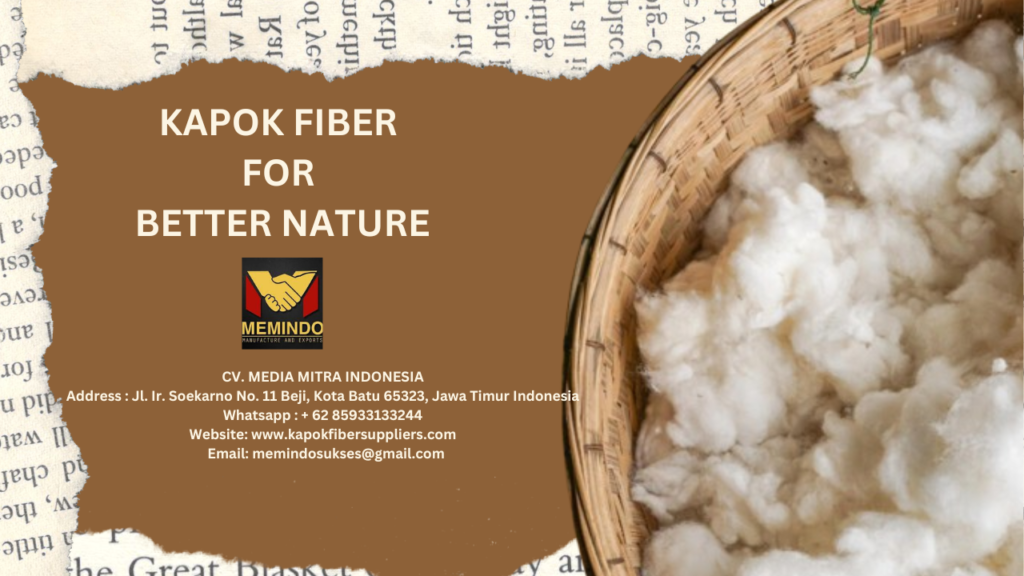Using kapok fiber for “better nature” aligns with the goal of promoting environmental sustainability and ecological balance. Here’s how kapok fiber can contribute to a healthier and more sustainable environment:

1. Support for Ecosystem Health
– Rainforest Preservation: Kapok trees are native to tropical rainforests, which are critical for global biodiversity, carbon sequestration, and climate regulation. By promoting kapok fiber, there’s an incentive to protect and maintain these vital ecosystems.
– Habitat Protection: The kapok tree provides habitat and food for various wildlife species. Sustainable use of kapok fiber can help ensure that these trees remain part of the forest, preserving the habitats of many creatures.
2. Sustainable Resource Management
– Renewable and Biodegradable: Kapok fiber is a natural, renewable resource that decomposes naturally. This reduces the environmental impact associated with synthetic materials, which can persist in the environment for long periods and contribute to pollution.
– Low Environmental Impact: Harvesting kapok fiber involves collecting the pods after they fall, which does not harm the tree. This method has minimal impact on the surrounding environment compared to more invasive resource extraction methods.
3. Reduction of Synthetic Materials
– Eco-Friendly Alternatives: Kapok can replace synthetic fibers in various products, such as cushions, mattresses, and insulation. Reducing the use of petroleum-based synthetic materials helps lower environmental pollution and dependence on non-renewable resources.
– Less Plastic Waste: Since kapok fiber is biodegradable, products made from it do not contribute to plastic waste, which is a major environmental issue. This contributes to reducing landfill waste and ocean pollution.
4. Energy Efficiency and Insulation
– Improved Insulation: Kapok’s excellent insulating properties make it an effective material for energy-efficient products. Better insulation helps maintain indoor temperatures and reduces the need for heating and cooling, which in turn lowers energy consumption and greenhouse gas emissions.
– Sustainable Construction Materials: Kapok can be used in eco-friendly construction materials, contributing to greener building practices and reducing the environmental impact of construction.
5. Economic and Social Benefits
– Support for Local Economies: Harvesting and processing kapok can provide sustainable income for communities in tropical regions, fostering economic development without harming the environment.
– Incentive for Conservation: Economic benefits from kapok production can motivate local communities to engage in conservation efforts and protect the rainforests where kapok trees grow.
6. Educational and Awareness Opportunities
– Promoting Sustainable Choices: Using kapok fiber in consumer products can serve as an educational tool, raising awareness about sustainable materials and encouraging consumers to make environmentally friendly choices.
– Inspiring Change: Highlighting the benefits of kapok can inspire businesses and individuals to adopt more sustainable practices and support the use of natural, renewable resources.
7. Long-Term Environmental Impact
– Carbon Sequestration: Tropical rainforests, where kapok trees are found, play a crucial role in sequestering carbon dioxide from the atmosphere. By supporting kapok fiber, we indirectly contribute to the preservation of these forests and their carbon-sequestering capabilities.
– Climate Resilience: Healthy rainforests contribute to climate resilience by regulating weather patterns and preventing soil erosion. Sustainable use of kapok helps maintain these important ecological functions.
Conclusion
Kapok fiber represents a powerful tool for promoting environmental sustainability and protecting nature. By supporting the use of kapok, we can contribute to rainforest conservation, reduce the reliance on synthetic materials, and support local economies in a way that aligns with ecological principles. Embracing kapok as a sustainable material helps foster a healthier, more balanced relationship with our environment.
CV. MEDIA MITRA INDONESIA
Address : Jl. Ir. Soekarno No. 11 Beji, Kota Batu 65323, Jawa Timur Indonesia
Whatsapp : + 62 85933133244
Website: www.kapokfibersuppliers.com
Email: memindosukses@gmail.com
Source by : Zulfan Arya Nurdiansyah
